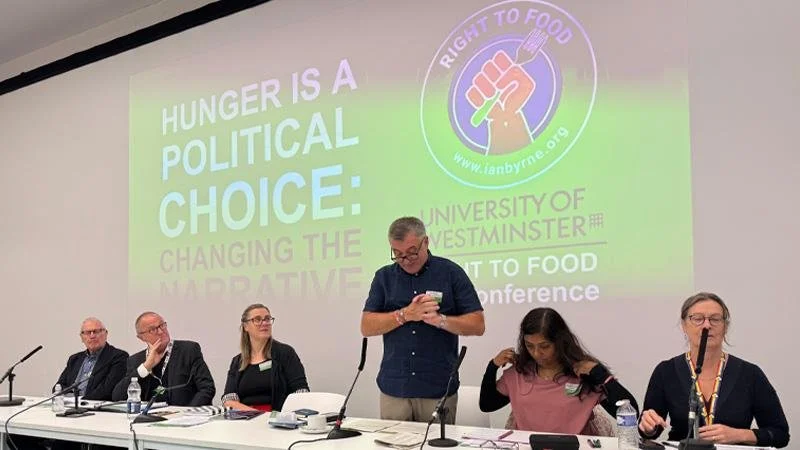Hunger is a Political Choice: The Right to Food UK Conference
Alex Doyle reports from the Right to Food Conference 2025
Reasserting the importance of politics was the theme of this year’s Right to Food conference. It was a fitting day for such a discussion - as far-right crowds mobilized on the streets of central London, panelists and audience alike reflected on the way that accessing food in the UK must be viewed as a part of wider struggles for justice and equality.
The introductory panel set the tone nicely. Ian Byrne MP, who has spearheaded the parliamentary battle for food justice, gave critical background to the Right to Food campaign. Critically, he emphasized the campaign as being birthed through grassroots and community-led organizing. Although the campaign will now seek to take parliamentary and legal routes through the Right to Food commission, Byrne insisted on this bottom-up approach as being fundamental to the campaign’s longevity and success.
Indeed, the theme of community-led responses to achieving food justice seeped throughout the conference, with panels such as ‘Organising amongst the grassroots’, ‘Community organizing for the Right to Food’, and ‘Setting up Right to Food groups’ prompting thoughtful and impassioned discussions.
Grassroots Organising
Talking about the need to organize amongst the grassroots is a critical ingredient to framing food as a political issue. Discussing the workplace as one strand of the grassroots, Sarah Woolley, president of BFAWU, agonized over the shameful contradiction of UK food workers being forced to use food banks. This highlights that the Right to Food is a trade union issue. Turning to the extensive network of charitable food provisioning, Dr Sharon Noonan-Gunning outlined some of the consequences of the charitisation of public health and food provision; the network of charities and community food initiatives, whilst often doing fantastic work, are evidence of an approach which favours food security over food sovereignty, ultimately at the expense of local and national democracy.
The Power of Purchase
As well as the mobilizing element required to achieve change to the food system, the conference was also full of granular analysis regarding the policies necessary for this change. Professor Kevin Morgan highlighted the ‘power of purchase’, a synonym for but a more palatable term than ‘public procurement’, as a critical lever to pull in achieving food justice. As well as increasing incomes so that people can access good quality food in sufficient quantity, it is necessary that we can procure environmentally sustainable, nutritious food in the first place.
Similarly, technical and practical discussions abounded regarding which alternative farming methods should be used to optimize our human and environmental health whilst also achieving food sovereignty. For example, Karolina Rodriguez brought forward agroecology as a technique which is both more harmonious with natural processes as well as a more efficient use of land than industrial agriculture.
The Right to Food and International Solidarity
The conference framed the Right to Food in the UK as inseparable from the global struggle for food justice and against the weaponization of hunger – in other words, the Right to Food has anti-imperialism at its core. As such, panelists expressed solidarity with those at the most acute end of food injustice across the world, particularly innocent civilians suffering from hunger and malnutrition in Palestine and Sudan.
The Right to Food conference was an energizing and thought-provoking event. By bringing together activists, academics, frontline workers/ volunteers, and parliamentarians, it made for a discussion rich in both theory and tangible action to channel in working towards food justice in the UK.

